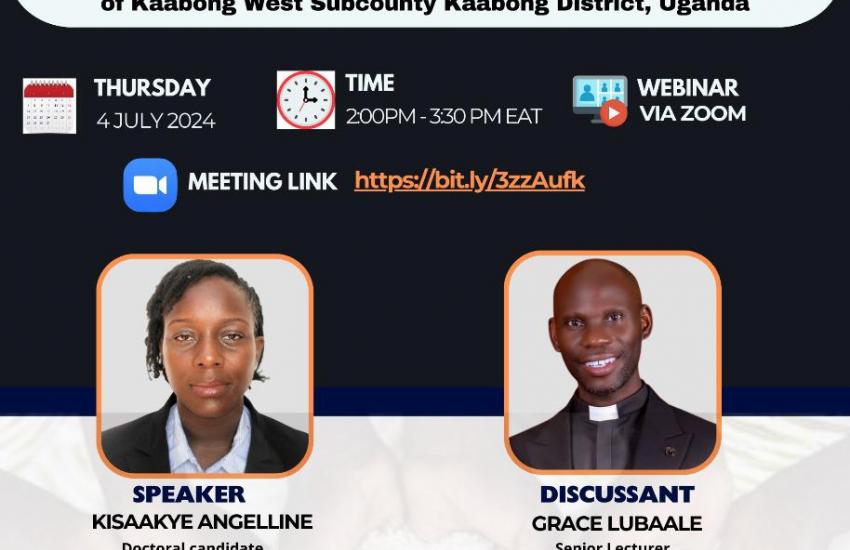IDS Seminar on “Gender Roles and Food Security: A Differential Impact Analysis of Kaabong West Subcounty Kaabong District, Uganda.”
The Institute for Development Studies on Thursday, 4th July 2024 held its weekly seminar series, themed “Gender Roles and Food Security: A Differential Impact Analysis of Kaabong West Sub county Kaabong District, Uganda.” from 2pm-3.30pm EAT.
The presenter was Kisaakye Angelline, a doctoral candidate at the Institute for Development Studies, University of Nairobi, and a lecturer at Kyambogo University, Uganda. She holds a Master’s Degree in Development Studies from Uganda Martyrs University-Nkozi and a Bachelor’s Degree in Development Studies from Kyambogo University.
Angelline has a profound interest in development issues, particularly gender, climate change, food security, and personal human development. Her dedication to these areas is reflected in her commitment to fostering optimism, creativity, and personal growth among her students and community.
The discussant was Grace Lubaale, a senior lecturer at Kyambogo University where he has served since 2001.He specializes in Gender and Development. He has supervised over 30 graduate students to completion with over 20 publications and six articles in gender-related fields. Lubaale is interested in education, human rights, and development planning. He is a human rights advocate, research consultant, supervisor, development consultant, international evangelist, church minister, theologian, educationist, counselor, mentor, and community development animator.
The session was moderated by Mr. John Njoka, from IDS.
The presenter in her introduction noted that “Kaabong district suffers critical levels of acute malnutrition. Approximately half (45%) of households in the Kaabong district experience food insecurity (FSNA, 2017). (TAAT, 2022; Gazu et al., 2023). In addition, the semi-arid environment, livelihoods focused on subsistence, relative population isolation, and unstable security situation all play a significant role in the region's food security (USAID, 2014)."
Her study seeks to investigate how and in what ways gender roles impact food security in the Kaabong West sub-county, Kaabong district. She will use the Intersectionality theory in her study.
The study abstract is as follows:
Food security is not only a fundamental human right but also a prerequisite for the success of any development program. Food insecurity affects men and women differently. This study therefore seeks to investigate the differentiated impact of gender roles and food security in Kaabong West sub-county, Kaabong district. This study seeks to explore the gender roles terrain; the contribution of men and women towards food security; and the mitigation strategies for gender-based vulnerabilities to food insecurity in Kaabong West sub-county, Kaabong district. The study will employ a convergent parallel design of basic mixed methods approaches to a study population of boys/ men and girls/women residents of Kaabong West sub-county, Kaabong district (aged 18 and above). Data will be collected through a household survey, which will be complimented by both key informant interviews and in-depth interviews. Data sets on gender roles and food security will be analysed to test hypotheses and variables (Gender roles and Food security). Data sets to be analysed will include; the gender roles terrain, the contributions of men and women towards food security, and mitigation strategies for gender-based vulnerabilities to food insecurity in Kaabong West sub-county, Kaabong district.
Keywords: Gender, Gender Roles, Food Security
The discussant made the following recommendations to the presenter:
- Improve on the background
- Improve on the statement of the problem
- Objectives are not in tandem with the topic and conceptual framework and need to be reworked.
- To shorten her PowerPoint presentations to avoid reading like notes.
The moderator, Mr. Njoka, asked Angelline to bring the literature review before the theory. He added that the intersectionality principle should be seen throughout the study. Further, she should explore issues of power dynamics in her study; who owns the land, controls incomes, government policies, and how these influence what she is studying.
Some of the questions raised by other participants include:
Thank you Anjeline for such a good presentation. But I didn't get who are the likely beneficiaries of this study? kindly share please.
Rahma Hassan: Very well done Angeline - Great topic and good grasp of the emerging literature in the field. You could try to centre one theory and draw on the other 2.
Sharon Mosin: Really like the suggested objectives around the three themes. Brilliant.
Rahma Hassan: Angeline could get much more from some FGDs and IDIs in the community beyond the KII’s.
Bikolimana MUHIHI: The study direction is good, timely, and very relevant.
My question is, how will differential impact analysis be carried out? I see a lot of qualitative approaches.
Lilac Osanjo: Great job Angeline. A small comment - give a little more insight into the "gender roles" then balance with the food security. Good job.
Bikolimana MUHIHI: Mixed approaches will give her the best results, on the impact analysis she has some light touches on quantitative approaches and supports with qualitative arguments.


